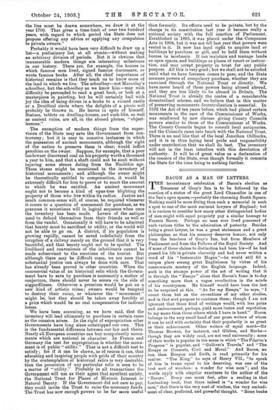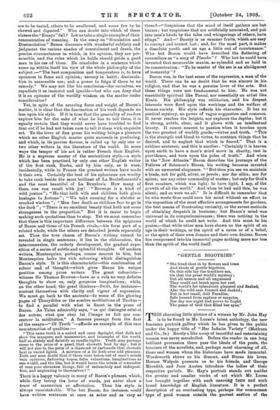BACON AS A MAN OF LETTERS. T HE tercentenary celebration of
.Bacon's election as Treasurer of Gray's Inn is to be followed by the erection of a statue of the great Lord Chancellor in one of the Inn's open spaces,—probably the charming South Square. Nothing could be more fitting than such a memorial in such a spot to one of the most eminent lawyers of England ; but it is curious to consider how many other distinguished bodies of men might with equal propriety pay a similar homage to Francis Bacon. Perhaps no man ever lived possessed of such various titles to the admiration of posterity. Besides being a great lawyer, be was a great statesman and a great philosopher, so that his memory deserves honour, not only from the benchers of Gray's Inn, but from Members of Parliament and from the Fellows of the Royal Society. And if none of these claims to distinction had been his—if he had passed his life in private obscurity and had never written a word of his "Instauratio Magna "—he would still fill a unique place among great Englishmen by virtue of his consummate mastery of the English language. Indeed, such is the strange power of the art of writing that it is through the "Essays" alone that Bacon's fame is to-day something more than a vague recollection in the minds of his countrymen. He himself would have been the last to be surprised at this. "As for my Essays," he says, "I count them but as the recreations of my other studies, and in that sort purpose to continue them; though I am not ignorant that those kind of writings would, with less pains and embracement, perhaps, yield more lustre and reputation to my name than those others which I have in hand." Bacon belongs to the very small band of our prose writers of whom it can be said with certainty that their popularity is as great as their achievement. Other writers of equal merit—Sir Thomas Browne, for instance, and Gibbon, and Burke— though they are widely read, are not read universally ; none of their works is popular in the sense in which "The Pilgrim's Progress" is popular, and " Gulliver's Travels," and "The Essays or Counsels, Civil and Moral." And Bacon, no less than Bunyan and Swift, is read primarily for his matter. "The King," he says of Henry VII., "to speak of him in terms equal to his deserving, was one of the hest sort of wonders: a wonder for wise men"; and the words apply with singular exactness to the author of the "Essays." Every one must feel, after a reading in that fascinating book, that there indeed is "a wonder for wise men," that there is the very soul of wisdom, the very embodi- ment of clear, profound, and powerful thought. "Some books
are to be tasted, others to be swallowed, and some few to be chewed and digested." Who can doubt into which of these classes the "Essays" fall? Let us take a single example of their concentration of meaning. In the essay on "Simulation and Dissimulation" Bacon discusses with wonderful subtlety and judgment the various shades of concealment and deceit, the precise circumstances in which, in his opinion, they are per- missible, and the rules which he holds should guide a good
man in his use of them. He concludes in a sentence which eume np within itself his view of the whole philosophy of the subject :—" The beet composition and temperature is, to have openness in fame and opinion; secrecy in habit; dissimula- tion in seasonable use; and a power to feign if there be no remedy." We may not like his conclusion—for ourselves, we repudiate it as immoral and ignoble—but who can deny that it is an epitome of the worldly wisdom on the matter under consideration?
Yet, in spite of the amazing force and weight of Bacon's matter, it is clear that the fascination of his work depends no less upon his style. If it is true that the generality of readers explore him for the sake of what he has to tell them, it is equally certain that they would never have troubled to find that out if he had not taken care to tell it them with exquisite art. To the lover of fine prose his writing brings a pleasure
which no other English master quite succeeds in producing, and which, in its precise flavour, is called up by only one or two other writers in the literature of the world. In some
ways the temper of his art is rather French than English. He is a supreme master of the sententious style,—a style which has been practised by only one other English writer of the first rank, Burke, and by him only, as it were, incidentally, while in France the greatest writers have made it their own. Certainly the best of his aphorisms are worthy to take rank beside the most brilliant of La Rochefoucauld's and the most beautiful of La Brnyere's. How many of them one can recall with joy ! "Revenge is a kind of wild justice" ; "He that hath wife and children bath given hostages to fortune" ; " We take cunning for a sinister or crooked wisdom "; "Men fear death as children fear to go in the dark " ; "There is no excellent beauty that bath not some strangeness in the proportion." But it is easier to begin making such quotations than to stop. Yet we must remember that there is this important difference between the epigrams of Bacon and those of his French rivals,—his form part of a related whole, while the others are detached jewels separately set. Thus the true charm of Bacon's writing cannot be revealed in single sentences; it lies in the elaboration, the interconnexion, the orderly development, the gradual expo- sition of a series of subtle and splendid thoughts. Of modern wiiters, Monteequieu, perhaps, comes nearest to him, but Montesquieu lacks the rich colouring which distinguishes
Bacon's style. It is this characteristic—this combination of colour and of thought—which gives Bacon his unique position among prose writers. The great colourists—
witness Sir Thomas Browne—have as a rule no very definite thoughts to show us, only gorgeous imaginations ; while, on the other hand, the great thinkers—Swift, for instance— content themselves with clarity and vigour of expression. We must go back to the ancients—to some of the glowing pages of Thucydides or the sombre meditations of Tacitus- to find a parallel with what is finest in the prose of Bacon. As Taine admirably says, " ce qui distingne celui-ci des entree, o'est qne chez lui l'image ne fait que con- centrer in meditation." A famous passage from the first of the essays—" Of Truth "—affords an example of this rare concatenation of qualities :—
"This same truth is a naked and open daylight, that cloth not show the masques, and mummeries, and triumphs of the world, half so stately and daintily as candle-lights. Truth may perhaps come to the price of a pearl, that showeth best by day ; but it will not rise to the price of a diamond or carbuncle that showeth best in varied lights. A mixture of a lie doth ever add pleasure. Doth any man doubt that if there were taken out of men's minds vain opinions, flattering hopes, false valuations, imaginations as one would, and the like, but it would leave the minds of a number of men poor shrunken things, full of melancholy and indisposi- tion, and =pleasing to themselves ? "
There is a happy valiancy in many of Bacon's phrases, which, while they betray the lover of words, yet never show a trace of mannerism or affectation. Thus his style is always unmistakable. Who but Bacon, for instance, could bave written sentences at once as sober and as racy as these ?—" Suspicions that the mind of itself gathers are but buzzes ; but suspicions that are artificially nourished, and put into men's heads by the tales and whisperings of others, have stings." And—" Beauty is as summer fruits, which are easy to corrupt and cannot last; and, for the most part, it makes a dissolute youth and an age a little out of countenance." Who but Bacon would have described the flattering of counsellors as "a song of Placebo" ? Who but he could have invented that memorable maxim, so splendid and so bold in its concentration : "To be master of the sea is an abridgment of monarchy " ?
Bacon was, in the best sense of the expression, a man of the world. There can be no doubt that he was sincere in his religion, and that he was a genuine lover of the arts. But these things were not fundamental to him. He was not. essentially spiritual like Pascal, nor essentially an artist like Keats. His philosophy was utilitarian, and his deepest interests were fixed upon the workings and the welfare of , human society. His style reflects his character. It has no poetical mystery, no power of vague suggestion and romance. It never reaches the heights, nor explores the depths ; but it is strong, subtle, clear, and it glows with an intellectual beauty. It comes nearest to passion when it touches upon the two greatest of worldly goods,—virtue and truth. "This is the strength and blood to virtue, to contemn things that be, desired, and to neglect that which is feared." That is a sublime sentence; and this is another: "Certainly it is heaven, upon earth to have a man's mind move in charity, rest in providence, and turn upon the poles of truth." And when in the "New Atlantis" Bacon describes the journeys of the Fellows of Solomon's House, his writing becomes invested with an unwonted eloquence. " ' But thus you see we maintain a trade, not for gold, silver, or jewels ; nor for silks; nor for apices; nor any other commodity of matter; but only for God's first creature, which was light: to have light, I say, of the growth of all the world.' And when he had said this, he was silent; and so were we all." It is difficult to remember that he who wrote thus could turn his mind without an effort to the exposition of the most effective arrangements for gardens, the beat means of frustrating curiosity, or the surest methods of obtaining despatch in business; but Bacon's mind was universal in its comprehensiveness ; there was nothing in the world of which he could not write. And this must be his praise,—that while other men have shown us the spirit of an age in their writings, or the spirit of a cause or of a belief, or the spirit of their own dreams and their own desires, Bacon has compressed into his immortal pages nothing more nor less than the spirit of the world itself.















































 Previous page
Previous page